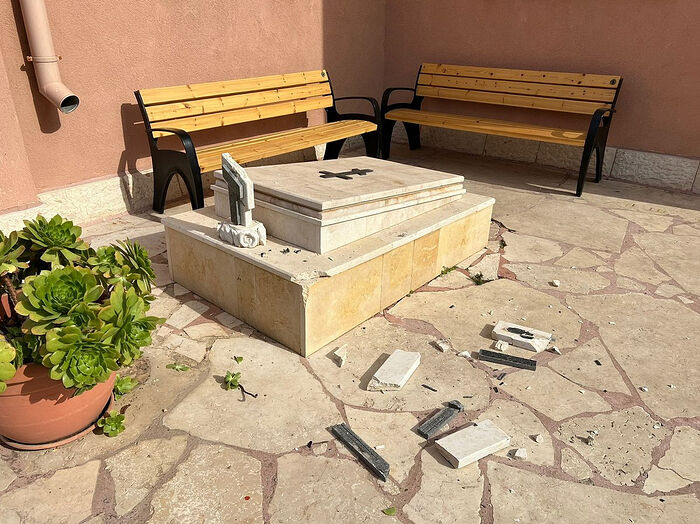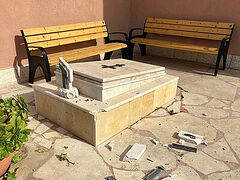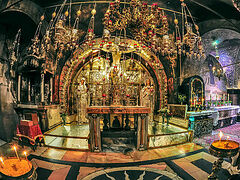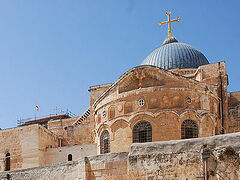In recent months, more and more alarming reports have been coming from the Holy Land about the beginning of real persecution of Christian denominations there. This problem has befallen the Russian Orthodox Church as well: according to Igumen Nikon (Golovko), the Secretary of the Russian Orthodox Ecclesiastical Mission in Jerusalem, there are places that have become real hot spots for Orthodox Christians, where conflicts flare up with frightening regularity. We have talked with Fr. Nikon on what is happening today in the Holy Land, cases of vandalism, attempts to seize church property, and street fights.
—Father Nikon, one gets the impression that attacks on Christian denominations in the Holy Land have begun to occur with frightening regularity. Is that true? And if so, when did it start? With the pandemic?
—Yes, the destructive processes have intensified with the outbreak of the pandemic and the chain of lockdowns in Israel. Isolation from the outside world, coupled with the stop of the flow of tourists and pilgrims, have had a strong impact on the sections of society that were involved in tourism: lack of income, uncertainty about the future, and the growing psychological pressure of circumstances have played a negative role. People have begun to lose patience, and this aggravates social conflicts. Clashes between Muslims and Jews, cases of attacks on Christian church property and hostility towards Christians have become more frequent, and the number of acts of vandalism, and the degree of religious intolerance in general have increased.
At the same time, it should also be noted that due to the lack of pilgrims, many Christian churches have become empty, no one can see numerous Christian visitors in popular pilgrimage sites; and perhaps this circumstance has instilled into some “hot heads”—representatives of local radical religious groups—the idea that now it is just the right time to lay their claims to Christian land and property.
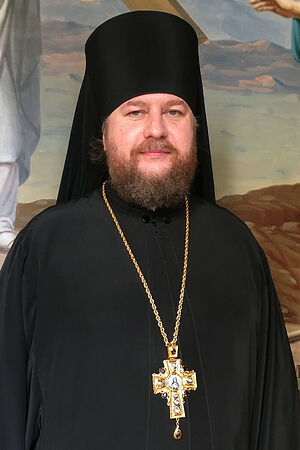 Igumen Nikon (Golovko) —And problems started…
Igumen Nikon (Golovko) —And problems started…
—In the last two years we have seen an increase in problems associated with religious radicalism on our Russian plots of land and churches in the Holy Land. So, for example, in the last year alone there were three cases of illegal entry onto the territory of Gorny Convent, one of which was associated with an attempt to break into the Church of the Kazan Icon. Over the last year there were several cases of encroachment on church property in our dependency in Jaffa and a blatant act of vandalism, when an unidentified culprit, having entered the area, destroyed several crosses in the Orthodox cemetery, desecrating the graves. The dependency of the Russian Mission in Jerusalem in Magdala on the shores of “the Sea of Galilee” (Lake Tiberias), widely known to our pilgrims thanks to the wonderful warm radon springs and glorious views of the lake, has become a real “hot spot” over recent years: Almost every week there are attempts to encroach on its land, and there were also acts of vandalism, accompanied by threats against the sisters living in the dependency. The Russian Embassy has sent several diplomatic notes to the Israeli Foreign Ministry in this regard.
—Does the problem concern only the Russian Church, the Orthodox Churches, or all Christians in the Holy Land in general?
—Alas, this problem concerns all Christians in the Holy Land. For example, thanks to the efforts of Patriarch Theophilos III of Jerusalem, the world community is now becoming ever more aware of the difficult situation that has developed around the two most famous guesthouses of the Patriarchate of Jerusalem, so beloved by pilgrims, on the square at Jaffa Gate in Jerusalem. A local radical religious organization declares that it has allegedly acquired the ownership rights to these sites. Thus, not only is the law being violated (since such a deal was out of the question), but the very foundations of the so-called status quo, the way of life of representatives of Judaism, Christianity and Islam that has developed in the Old City, are being undermined.
We are aware of numerous cases of attacks by radical Jews on Armenian seminarians and priests: in Zion, where the theological seminary of the Armenian Patriarchate of Jerusalem is located, sometimes real street fights take place. Cases of attacks on monasteries belonging to the Franciscan custody in the Holy Land have also become more frequent.
—When we were preparing for this talk, you mentioned that there was street violence and insults against clergy and laity, which you have now confirmed. What is the most outrageous case in recent times that you remember?
—I recall an incident that happened about two years ago, when about twenty seminarians and a dean of the Armenian seminary and a cleric of the Armenian Patriarchate of Jerusalem who was accompanying them, suffered in a clash with a group of religious Jews who not only used physical violence, but also sicced a dog on them. As a result of the incident, several seminarians and the dean of the seminary ended up in hospital. In this regard, the Armenian Patriarchate appealed to the police and published an appeal in which it emphasized the regular nature of attacks on Armenian clerics and students, while noting police inaction.
—You said that one might even not be served in a store. Was it like this before?
—In a big store, at least in a large supermarket, they certainly won’t refuse service. But in a small store in some city block with a predominantly Jewish population they can. The same thing happens in the market, but much more often.
—Much more serious is the issue of the expulsion of Christians from all spheres of public life. Israel is on the one hand a national state; but on the other hand, there are many baptized Jews among its citizens. Are they caught in the middle? Can you give us several examples of what this expulsion looks like?
—You are right. I’m not talking about the Orthodox Arabs—they are the least protected stratum of society; but even baptized Jews have a hard time here. There are cases of insults and bullying in public schools, nursing homes, and stigma at workplaces. In view of this, some families who initially sought opportunities for a prosperous and happy life in Israel decide to emigrate to countries with predominantly Christian populations—to Canada, the USA or Europe.
—You have already mentioned cases of encroachment on church property. Could you tell us more?
—Yes, as I have mentioned, all the Christian communities in the Holy Land—not only Orthodox, but also Catholic, Anglicans and others—are constantly working to preserve their plots of land and buildings purchased for religious purposes with the funds of their compatriots and prevent similar claims in the future. Taxation in Israel deserves special attention: It takes great effort for all Christians to prove to local authorities that religious objects and non-profit properties should not be subject to municipal taxes. Not long ago, if you remember, even the Church of the Holy Sepulcher was closed for several days in a protest of Christians against unfair and suffocating taxes on religious sites in Israel.
—But “pilgrimage tourism” (if I may use such a term) is a serious source of income for the State and local businesses, right? Or does even this argument not work here?
—As the last two years have shown, Israel can live without tourism. This income item has turned out to be not so significant in the country's overall budget. True, the absence of tourists and pilgrims has hit some population segments (especially the Arab and Christian segments) who were involved in the tourist service sector, but in general the State has showed its viability. Israel successfully sells IT technologies, the banking system is highly developed here, and, as experts say, these business areas are strategic for the country.
However, one should not forget the Jewish pilgrims who come to Israel in large numbers to bow to the Western Wall—their numbers hardly went down even in the most “closed” months of the pandemic.
—How do you see a way out of this situation? Obviously someone needs to intervene...
—I am sure that after the pandemic is over, life in the Holy Land will basically return to its usual more or less peaceful course; but something else is also important: These years have shown us Christians that we should not tolerate oppression in the Holy Land in silence; on the contrary, we must unite, speak loudly and clearly about the problems that exist, and get international forces involved in resolving the conflicts flaring up here, making every effort to maintain the Christian presence at the greatest shrines of the world.

